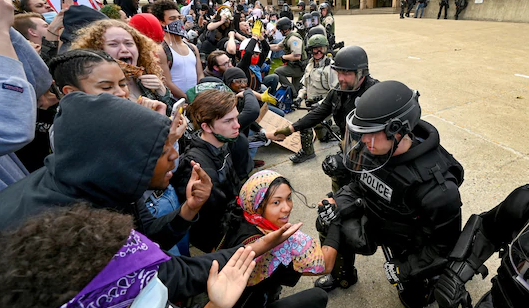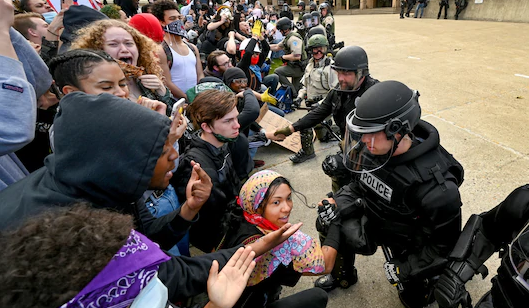The murder of African-American George Floyd by a white police officer in the United States, and the subsequent protests to demand justice, have captured the attention of Cuba's state media, until now focused almost exclusively on Covid-19.
In Cuba anti-racist activist Marthadela Tamayo and rapper/activist Osvaldo Navarro both pointed out how Cuba's official media have taken advantage of the news to criticize the US government and racial discrimination in the neighboring country.
According to Navarro, George Floyd's murder is "another element in the Cuban government's propaganda mix," which avoids any recognition of the legality of human rights groups, and the right to carry out peaceful protests, in the United States, both non-existent in Cuba.
Political scientist Manuel Cuesta Morúa observed that, initially, the media concentrated on exploiting the issue of racism in the United States and stressing that the police there are racist, but then coverage began to drop. "They’re avoiding the issue of racism in Cuba, but the issue is being raised on social media."
"The Cuban government now not only has to defend its stances on the issues, but also must grapple with the opinions of Cubans on the internal situation. And this always generates comparisons. They have striven to portray the ugly face of racism in the US, but have not covered the police who have supported or even joined in the protests in many US cities," he explained.
As an anti-racist activist, Navarro has been following the opinions of people in Cuba on the events in the US. Many dismiss the protests as acts of vandalism. He believes that these opinions are based on ignorance of what Afro-descendants suffer in the United States, and that Cubans should also learn to demand their rights.
He also blames this ignorance for various contentions that Floyd's murder was not motivated by racism, but rather was a result of the officer's agitation. According to some, he "was only doing his job".
Cuesta Morúa, meanwhile, observes that, with regards to racism, the average Cuban's perspective on what is happening in the United States and what the Cuban Government thinks, overlap, to a large extent. In this respect he believes that the Cuban government's doctrine has been successful. Although –thanks to social media, and the possibility of traveling– many can see for themselves that not all Americans are racists, most people do not.
The coordinator of Candidates for Change (CxC), Juan Moreno, condemns the murder of George Floyd, but describes the protests that ensued in the United States as riots rather than protests.
"Protests were what African-American groups did during the time of Martin Luther King, demonstrating consistent and civic conduct. What we are seeing are riots and vandalism fomented by factions on the left, and nobody knows exactly who's behind them. There are statistics that, in the last ten years, more than 1,600 police officers have been killed in the United States, and more than 70% have been white officers, at the hands of African-Americans."
Although Moreno describes the police's actions in Cuba as "repressive", he thinks it transcends skin color.
"The Cuban Police and the Army, which have taken to the streets (with the pretext of the coronavirus), repress Cubans savagely, regardless of their race."
Marthadela Tamayo and Osvaldo Navarro disagree, believing that the Cuban Police do make racist distinctions.
"In Cuba there is a lot of repression against people of African descent," says Tamayo. "The people who live in the settlements, and have suffered pressure from the Police, to evict them, are mostly Afro-descendants. The two girls allegedly abused by police are Afro-descendants. As for the political violence suffered by activists and defenders of Afro-descendants' human rights, it is also very much marked by racism," she says.
Both she and Navarro and Cuesta Morúa point out that most of the people punished in the recent show trials broadcast on state television, without due process, were black.
In Cuesta Murúa's opinion, Cubans are aware that most victims of police repression are blacks and mestizos.
"The majority of the people know that prisons are more populated by black and mestizo people. Most of those imprisoned for constituting 'social hazards' are black. What we see in Cuba is a blaming of the victim: blacks are singled out as guilty of creating their own situations. Racism is not understood from a structural perspective, but people know that blacks are the police's scapegoats in this country," he explains.
He also disagrees with those who have described Cuban police officers as "restrained" on the networks, when comparing their behavior with that of United States police officers. This is not the reality of Cuban police's conduct in recent times, visible on Facebook and other social networks he says, finding this type of comparison dangerous, a common tactic of the Cuban Government to downplay repression.
In this regard, Navarro points out that "restrained" police would hardly cooperate in the imprisonment of peaceful activists, and recalls that the Cuban Police are called the PNR: National Revolutionary Police, serving the interests of the Communist Party.
"If there were a scenario of mass protests in Cuba, I can assure you that the police, the military and the black berets would be out there beating people left and right, doing whatever was necessary to crush the protests, as happens in other parts of the world," he says.
Cuesta Morúa takes away three key lessons for Cubans from has happened in the US:
"First, Cubans are seeing that the police in the United States behave exactly like the police in Cuba. Second, the value of publicizing dramatic and traumatic events like this. People have learned that social media and the public communication of events of this nature can raise awareness. People are already saying that we have to film and upload everything. What this incident demonstrates is not so much that racism in the United States persists, but that everyone has a digital camera. Third, governments have a lot to do with the difficulties, shortcomings and situations related to discrimination in countries."
"The Cuban government has always said that racism here is a phenomenon inherited from when Cuban was a colony. But people are beginning to realize that a lot depends on what governments do or don't do to solve these problems."

